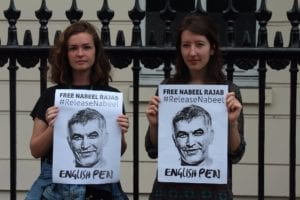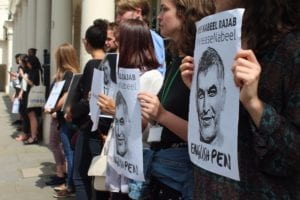Grace Larkin
English PEN
London, England
My internship with PEN has been incredible so far. Working with the Writers at Risk program has allowed me to learn about specific cases of writers who are currently imprisoned or exiled. The other day with PEN I attended a protest outside of the Bahrain embassy in London on the one year anniversary of Nabeel Rajab’s imprisonment. Nabeel Rajab is one of Bahrain’s leading human rights activists and the founder of the Bahrain Center for Human Rights (BCHR). He is also Founding Director of Gulf Centre for Human Rights (GCHR) and a member of the Middle East advisory committee at Human Rights Watch.
Nabeel has faced physical intimidation, arrest, detention and travel bans as a result of his work and has been sentenced to prison in violation of rights of assembly and expression. Ken Roth, Human Rights Watch’s executive director, named Nabeel as one of two human rights activists currently imprisoned whom he thought most resembled “the next Nelson Mandela.”
Since 2011, Nabeel has faced multiple prosecutions and prison sentences for his activism. He was in prison from 2012-14, after which he continued to lobby European governments to support human rights and challenge the Bahraini government on claims that they had made reforms. He has been banned from travelling abroad since 2014. Comments on his Twitter account which were critical about the Saudi-led coalition airstrikes in Yemen and alleged torture in Bahrain’s infamous Jau prison led to his arrest in April 2015 and again in June 2016.

Nabeel is currently in detention while awaiting trial related to the tweets, for which he faces up to 15 years in prison: ten years for the charge of “deliberately announcing in wartime false or malicious news, statements or rumours,” two years for “offending a foreign country,” (referring to Saudi Arabia), and an additional three years if he is convicted of “offending national institutions” for comments about torture in Jau Prison.
Nabeel is also facing separate charges for “broadcasting false news and spreading tendentious rumours that undermine the prestige of the state” for pieces in The New York Times and Le Monde. If found guilty, he could face an additional three years in prison.
Rajab’s health has suffered during his detention. He has needed two operations and has developed other conditions that required emergency treatment. He has been in solitary confinement for much of this time and has been denied access to proper care.
On 17 May 2017, Nabeel’s trial related to the tweets was postponed for the 14th time, to 7 August.
It’s important that we keep reading the work of writers like Nabeel, so I’ll leave you with the words he has been imprisoned for: “Letter From a Bahraini Jail.”
